|
During these turbulent times we must remind ourselves repeatedly that life goes on.
This we are apt to forget. The wisdom of life transcends our wisdoms; the purpose of life outlasts our purposes; the process of life cushions our processes. The mass attack of disillusion and despair, distilled out of the collapse of hope, has so invaded our thoughts that what we know to be true and valid seems unreal and ephemeral. There seems to be little energy left for aught but futility. This is the great deception. By it whole peoples have gone down to oblivion without the will to affirm the great and permanent strength of the clean and the commonplace. Let us not be deceived. It is just as important as ever to attend to the little graces by which the dignity of our lives is maintained and sustained. Birds still sing; the stars continue to cast their gentle gleam over the desolation of the battlefields, and the heart is still inspired by the kind word and the gracious deed. There is no need to fear evil. There is every need to understand what it does, how it operates in the world, what it draws upon to sustain itself. We must not shrink from the knowledge of the evilness of evil. Over and over we must know that the real target of evil is not destruction of the body, the reduction to rubble of cities; the real target of evil is to corrupt the spirit of man and to give his soul the contagion of inner disintegration. When this happens, there is nothing left, the very citadel of man is captured and laid waste. Therefore the evil in the world around us must not be allowed to move from without to within. This would be to be overcome by evil. To drink in the beauty that is within reach, to clothe one’s life with simple deeds of kindness, to keep alive a sensitiveness to the movement of the spirit of God in the quietness of the human heart and in the workings of the human mind-- this is as always the ultimate answer to the great deception. Excerpted from Meditations of the Heart by Howard Thurman, published by Beacon Press, 1953. _____________________________________________ The words of this spiritual mentor of Martin Luther King, Jr., can still offer us wisdom during times of rising anger and increasing hopelessness. We often reflect on the writing of Howard Thurman in Wisdom Tree Collective’s School of Spiritual Direction. He was a civil rights leader, a theologian, author, academic, and pastor who was a mystic at heart, finding solace in nature—a favorite oak tree was a spiritual friend, a nonhuman elder & mentor. Thurman also co-founded the Church for the Fellowship of All Peoples in San Francisco, the first racially integrated, intercultural church in the United States, which also valued the creative arts as a way of sharing the Good News. He was familiar with suffering. Let his words speak to your soul today. Read more of his wisdom in his book Meditations of the Heart.  Photo by Mark Lawson on Unsplash Photo by Mark Lawson on Unsplash There are some poems & places where the images stay with you. When September arrives, Postscript, by Irish poet, Seamus Heaney, is one of those poems for me. Read or listen and watch below. Postscript And some time make the time to drive out west Into County Clare, along the Flaggy Shore, In September or October, when the wind And the light are working off each other So that the ocean on one side is wild With foam and glitter, and inland among stones The surface of a slate-grey lake is lit By the earthed lightning of a flock of swans, Their feathers roughed and ruffling, white on white, Their fully grown headstrong-looking heads Tucked or cresting or busy underwater. Useless to think you'll park and capture it More thoroughly. You are neither here nor there, A hurry through which known and strange things pass As big soft buffetings come at the car sideways And catch the heart off guard and blow it open. __________________________ I remember being at a Nebraska rest stop during a wind storm on my way to Seattle from Cape Girardeau, Missouri, a cross-country move fraught with break-downs, both literal and metaphorical! As I was getting out of the car, the wind caught my driver's side door and blew it wide open. In that moment, all the stress, frustration, and anger that I usually succeed in keeping under wraps stormed to the surface. Much to my surprise, I started raging into the wind as my hair whipped all around! For any witnesses, I am sure it was a sight to behold. I felt both powerful and powerless. It’s a moment I will never forget. And while I have no desire to return to that rest stop in Nebraska, I return to the story quite often! There have been other times my heart has been caught off guard and blown open by unexpected beauty, love, and goodness. Sometimes they have been ordinary moments, sometimes extraordinary—from receiving a tender touch from my spouse after a fight (and it relaxing my defenses) to experiencing an ecstatic vision of being swept up in the Wave of Love (and it changing everything). Whether ordinary or extraordinary, surprises like these are heart-softening and heart-opening. There are places I make a point to return to because they are the places of these heart-softening and heart-opening moments. I had not been expecting anything (or at least I thought I knew what to expect) and suddenly something unforeseen and unplanned happens to “catch the heart off guard and blow it open,” changing that time of year, that place, and me, forever. I cannot help but encourage others to go and see (& experience) these places for themselves—from monasteries to places in nature--especially in September and October. How about you? What are your moments that have caught your heart off guard and blown it open? Where would you suggest someone make time to go to during September or October?  Photo by Mariana Beltrán on Unsplash Photo by Mariana Beltrán on Unsplash I asked my dear friend, Linda, what she thought the difference between "simplicity" and "settling" were and her answer surprised me. "Simplicity asks, 'What do you truly want?''" She went on, "With settling, I may settle for what I don't want and since it's not what I want, I keep looking for it.'" Then she shared an example from her own life. Many years ago, a woman asked if she wanted a certain set of dishes for her wedding and if she did, this woman would buy them for her. She really did not want them, but she felt uncomfortable saying "no" so she received them as a wedding gift. Since she had them and could get more pieces to match, she expanded her collection of dishes she did not want but settled for. But she noticed something. Whenever she was at a store that sold dishes, she looked at the patterns. Years of time and energy were spent on looking for dishes when she already had a full set! Her longing was left unsatisfied because she had settled so many years ago, afraid of offending the gift-giver. Now having retired, she decided it was not too late and she knew what she wanted. Much to the surprise of her family (who never knew she did not like the dishes!), she decided to box up her collection and put them for sale on a neighborhood social media site . Then she went out and bought the dishes she truly wanted, a beautiful butterfly pattern. Another woman happened to see the dishes she had for sale and was overjoyed for she had been looking for those exact dishes because they reminded her of her mother! Both were full of joy and satisfied with their purchases. Guess what happened after that? My friend stopped looking for dishes! We went on to talk about how we tend to buy things that are only on sale or we get what is cheap because we can have "more" of the item. Sometimes this is okay, but when it becomes a pattern, our collection of unwanted, unused stuff grows along with our dissatisfaction which compares and wants more. What do you truly want? It can be a difficult question. We need to stop and think rather than compulsively or fearfully say "yes" to what we do not want (or allowing others to decide for us or think we should want what others have). Jesus often asked people like blind Bartimaeus, "What do you want me to do for you?" It's not that Jesus could not see what Bartimaeus wanted, He wanted Bartimaeus to "see" and say for himself! It is a simple question. Yet answering honestly may just simplify the amount of internal and external stuff that becomes a burden--now that's a gift! 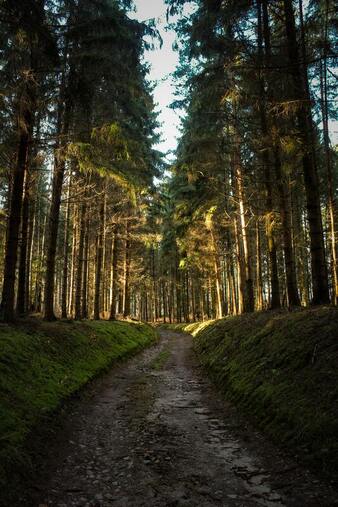 Photo by Darius Krause from Pexels Photo by Darius Krause from Pexels Honestly, I really don't. As a Spiritual Director, I'm listening and looking for life. For some this looks like a daily time set aside for reading Scripture and praying with words (whether silently, written, or spoken). This can be a very grounding and growing time. Or it can be a burdensome box on the spiritual checklist marked by guilt-if-I-don't-do-it. Even worse, it can be a time to grow the ego (rather than the mind of Christ). Reading the Bible and memorizing Scriptures are not a guarantee that one is on the path of and toward Life. Some things may have the appearance of life but underneath we find superstition or pride in disguise. However Spirit is in the process of utterly transforming our hearts (which impacts the lenses through which we see the world, including Scripture), that is what I am looking and listening for when I sit with a person in Spiritual Direction. Let me give an example: One person felt guilty because they did not want to do a one-year-Bible study initiated by their peers. I affirmed their resistance which was telling them the truth--should they say "yes" out of obligation, they would only grow resentment, not life, in their relationship with God and others. As I continued to listen, it became clear that this person would step out of their particular compulsions and into a deeper place the more they spent time in Nature (God's first revelation) and working with wood. Nature and Beauty were of utmost importance in growing in Love and Life. Their year would be better spent outside and in their workshop. There is no one-size-fits-all contrary to what you may have heard as a child, young adult, or a newbie to tending to the spiritual life. Having regular, uninterrupted time on the couch with a cat or dog or sharing a peaceful and delicious meal with one's partner, both are life-giving, love-growing practices. Others may find that silent meditation or reflecting on a poem expands their soul. Working with a dream from the night before, puzzling over a vision, wrestling with a spiritual question, painting, gardening, playing with children...the possibilities for spiritual practice and experience are endless because God is endless. It also does not have to be either-or when it comes to spiritual practice...either I read the Bible or I spend time in Nature. You might read the Bible in Nature. Spending time in Nature may give you new eyes with which to see the Bible when you do read it next (or you might discuss different ways to read Sacred Scripture with your Spiritual Director). So how do you know if your "daily quiet time" or spiritual practice is life-giving and growing? Reflect on the practice after you've engaged it for a length of time, at least a month. Any given day can feel like a slog and the fruit of the practice may show up outside of the time itself! For instance, after time in Nature, you may be calmer, less reactive, and more patient with others. Here are some questions to discover the fruit your practice is bearing (or not):
If you come for Spiritual Direction, I'm not going to give you Bible verses to memorize or critique your spiritual life. I'm going to listen for life within your life so that you may walk in the way that leads to Life (which is what the Bible encourages us to do!). What happens when we discount small actions or fear the possibility of humiliation?
We may not act at all. When we embrace both, we’re free to act. Any life-giving act, no matter how small, matters. According to Jesus, the Kingdom of God is like a mustard seed someone planted or like yeast a woman worked through a large amount of dough. Both the mustard seed and yeast required action from someone to bring about their potential. Both seed & yeast, the required action, and even the people may seem small and even hidden. Both may be small and hidden, but some actions require more (planting a seed is easier than kneading yeast through 60 lbs of dough!) Both contain big potential to benefit an entire community, offering nourishment in a variety of ways:
All of this from two small actions! If we're going to be sowers of seed and kneaders of the Bread of Life, know this... Action is never humiliation-proof. According to Fr. Richard Rohr, we're to pray for one good humiliation a day! What a way to stay humble and inevitably learn that humiliation is often a gateway to transformation! I promise you, especially if you, like me, are White (& an Enneagram One), it will happen as you enter into the on-going work of antiracism. Last fall, my daughter and I went to a weekend seminar to hear Nobel peace prize nominee, Fr. John Dear, talk about “Jesus as Peacemaker.” It’s been a constant part of our conversations ever since, becoming richer with insights from others. Earlier this year, Abby Buter pointed out the difference between being a “Peacekeeper” and a “Peacemaker” during the “Meditating with the Aramaic Beatitudes” class. The distinction is important…Jesus was the latter & said it’s the latter who are blessed. Fr. Dear gave my daughter a new language of nonviolence and she’s been quick to point out when I’m not (& other Christians aren’t) following in the footsteps of the nonviolent Jesus…oh the blessings of having a teenager in the house! But she’s right. And having it pointed out can be humiliating. When my children saw the video and photos of George Floyd, they were distraught. The conversation around Jesus and nonviolence needed to be taken to the next level. I decided to begin with my own faults and humiliations so they would learn not to fear their own. Around the dinner table, I told them stories from my own life of how I have thought, said, or did things that contributed to racism and upheld racist beliefs and systems. We talked about the reality of having inherited racist ideas as a culture and how Western Christianity’s own “superiority complex” has added to the problem by often making us overtly or covertly feel like we are definitely on the “winning team” and others are not. I told them of when I was a youth pastor and met with a community organizer after having spent time in Mississippi with Dr. John Perkins who encouraged me to do the same kind of community and racial reconciliation work with our students in our Missouri town rather than go elsewhere. Conversations with a couple of Black pastors in the area led me to talk to the Black community organizer. After telling him what I wanted to do, he laughed, and I felt humiliated. He pointed out how it was fine that I wanted to bring my students from the north side to the south side to help paint or whatever, BUT, it still didn’t change the fact that what the predominately Black kids on the south side were using as a community center was an old building that no one else wanted (but the kids were still happy to have) while the predominately White kids on the north side enjoyed a brand new top-of-the-line sports complex. It was an eye-opening conversation. Noticing my humiliation and naivete, he said, “I like you” then continued to challenge my White privilege. Doing “good work” and being a “good person” weren’t enough. At the end of our time, he still put me in touch with those who could help me line up service projects and then he sent me on my way (which included crossing a threshold I had no idea I would be crossing when I first walked in there). It was later that I could see how he was trying to open my eyes to the larger systemic problem of racial inequality and the problem of “White Savior Complex”--- our White Christian youth group would feel good about “helping” but the larger problems would still exist after we left (& in some cases our help would further uphold the problematic systems). Looking back, I’m grateful for the humiliation! Why?
Last month the opportunity to join an online discussion group facilitated by a Black friend from high school on the book, How to Be An Antiracist, came up. Aside: I've enjoyed listening to author, Ibram X. Kendi, read the audio version; often my kids listen, too. I knew a good humiliation (or more!) would come as I listened, shared, and became even more deeply aware of my ignorance both in high school and now (i.e. How did I not or how have I continued to not see, know, or consider this before?). However, experience tells me that humiliation need not stand in the way (and often is the way!). Do the conversations with family, friends, and neighbors matter? Does the discussion group matter? Refer to Jesus’ parables on the mustard seed and yeast. ______________ Two resources for ongoing learning, awareness & action:
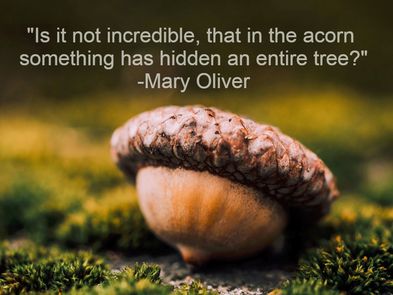 "Look deep into nature, and then you will understand everything better." -Albert Einstein This may very well be one of the reasons Jesus prayed outside so much! Whether on a mountain or on the side of one, in the wilderness, desert, or garden, Jesus found quiet places in creation to be alone with God the Father. He also encouraged people to observe nature to discover the deeper messages and invitations of God, instructing them to "notice how the lilies grow" or "look at the birds in the sky." (Matthew 6:25-34) All of nature is speaking! Whether individual parts or the rhythms and cycles of creation, if we observe using all of our senses and spend some time reflecting, we can discover what nature knows. With notebook or journal in hand, you might try the following prayer exercise and see what the Spirit of God has to say to you about your particular worries, stresses and concerns. What wisdom for your life is to be discovered in a single acorn or the falling leaves? Find out! How would you describe your November and December?
Now shift your attention from your own experience of November and December to nature's experience.
Give thanks for God's gift of (and the wisdom found in) nature! If there's a way to bless and care for creation, do it! 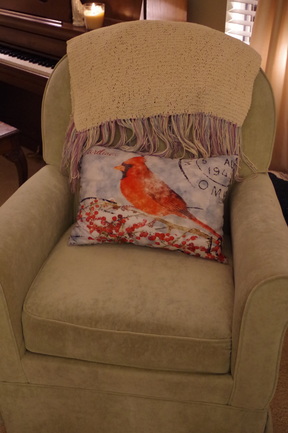 "It's going to be a long Advent," my friend said. She's experiencing and anticipating a long period of darkness. I, too, lament as I listen to the losses of those I sit with in spiritual direction or read news and see images of tragedy and anxiety around the world. Advent's holy invitation is to get in touch with our longing for the Light to come--for hope, peace, joy and love to return to our lives and to our world. Even when the night grows long and deepens, we wait. So how do we survive the dark? Mira, an early 16th century poet in India who knew suffering and helped others who suffered, wrote the following lines: I know a cure for sadness: Let your hands touch something that makes your eyes smile. I bet there are a hundred objects close by that can do that. My eyes smile when I think of my daughter's hand in mine, the coziness of a certain blanket, the fluffiness of the neighbors' cat who comes over for a daily visit, the smoothness of a stone with the word "TRUST" carved into it...but what do my eyes fall on in this moment? For THIS moment is where God comes to meet me. It's my mint green velour rocking chair. An ordinary object found right where I am. THIS is where God finds me, right where I am. And there's beauty there, MIra reminds me. So without a book or something to accomplish, my eyes smile as I sit down in this chair that tenderly holds me in the dark.
May you touch something that makes your eyes smile and in doing so be reminded that God is near...no matter how dark. |
AuthorKasey is a scarf, ball and club juggling spiritual director just outside of Nashville, TN. Play helps her Type-A, Enneagram 1 personality relax, creating space for poetry and other words to emerge. She also likes playing with theological ideas like perichoresis, and all the ways we're invited into this Triune dance. Archives
January 2024
Categories
All
|
By clicking “Sign up for E-News” I consent to the collection and secure storage of this data as described in the Privacy Policy. The information provided on this form will be used to provide me with updates and marketing. I understand that I may modify or delete my data at any time.
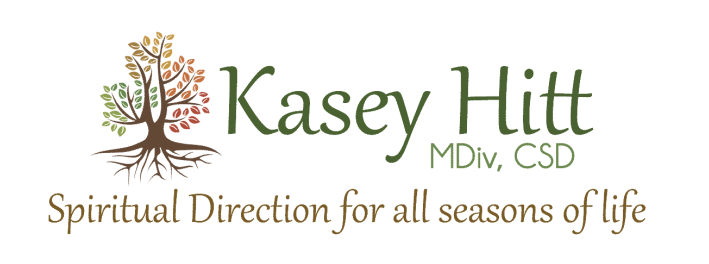
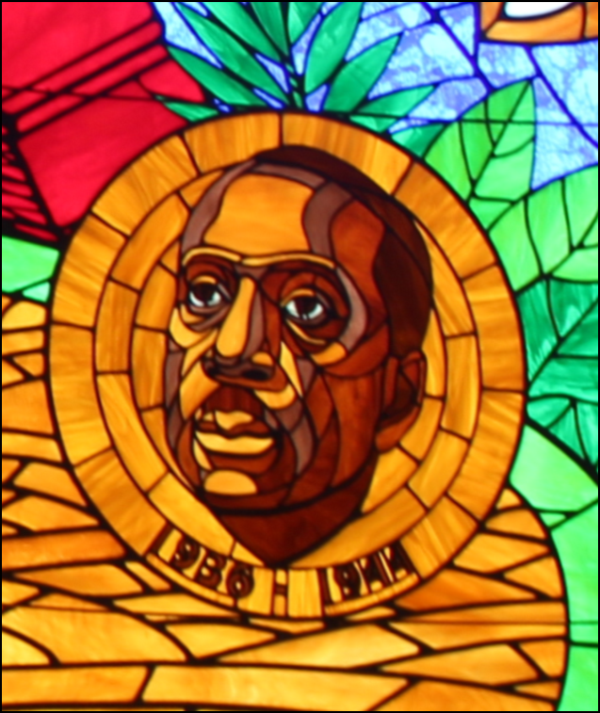
 RSS Feed
RSS Feed

